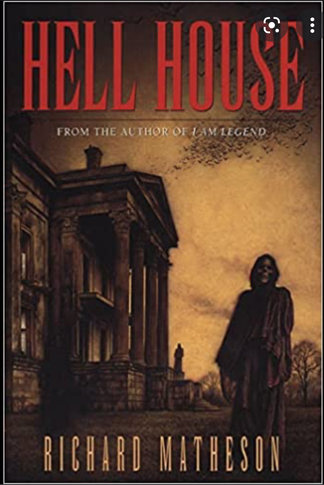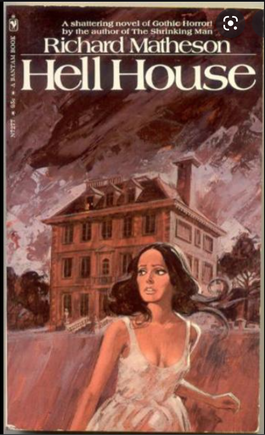 (Warning for readers of this blog who are not my classmates: there are spoilers in this post. Read at your own risk.) While I don’t read a lot of horror, this isn’t my first book by Richard Matheson. I knew going in that Matheson, who published this book in 1971 and passed in 2013, was “a product of his time,” as is so often said to excuse deceased white men who made terrible choices. I read I Am Legend just a few years ago. And, yeah, I noted that his protagonist Neville liked to only experiment on female vampire-zombies and how he sealed his vampire-zombified wife up in a living tomb. It bothered me only a little at the time. In the past I read for pleasure, not to analyze or pick apart a book or a novelist. But I’m more than just a casual reader working to maintain my geek cred now. I’m an MFA student and a professional author that works very hard to be inclusive in my own books. And in this book, Hell House—considered by many to be a cult classic—Matheson lets his misogynist-racist-homophobic flags fly. So while I’m sure a lot of people are sick of people writing about these issues that exist in our favorite books from the past, given who I am and what I believe in, if I’m assigned to write about this book, I’m going to focus on these issues. If we don’t ever talk about these things, they’ll never change. And while I enjoyed reading this book, certain elements are extremely problematic whether Matheson wrote them consciously or not. We look to our idols to help us form our ideals. So, let’s highlight them. We can start with little things. Incidental patriarchy, let’s call it. Both female characters in this book are nearly always referred to only by their first names. The men? Almost always by their surnames—or in the case of Dr. Barrett, by his surname plus his honorific. I've noticed this tendency in my own writing and have wrestled with what it means. I've concluded that innately this is a tendency to be more personal when it comes to women and to give more respect to men. In addition, Dr. Barrett dismisses everything Florence says—at times even before she says it. Since Fischer, as her colleague, says next to nothing in her defense, she has no one backing her up or questioning Barrett--a missed opportunity for tension. In addition, instead of doing the job he’s being paid to do—work with Florence—Fischer says she should just go home. In fact, at one point Fischer makes the statement that Florence was the weakest link of the four of their party. If that were the case, as the most experienced medium when it came to Hell House, shouldn't it have been his duty to encourage working together and deciding together about safety measures that could be taken? Moving on to characterization. We know little of Edith except that she nearly killed herself once when her husband went away without her for a week. We are supposed to believe that she is so mentally weak that loneliness nearly drove her to suicide—and it never once occurred to her to go visit a friend or anything. Barrett, her husband, seems to be aware of her lack of mental fortitude because he doesn’t want to leave her alone for a minute. She’s a fearful clingy wife with a weak constitution and an innate proclivity to alcoholism when under stress, who needs the presence of her husband to survive. That’s her characterization. Florence’s characterization is just as flawed, though it is developed far more. She is depicted as an impulsive, reckless, idealist religious zealot. She believes that the souls trapped in Hell House can be freed by love alone if she just prays enough. She keeps herself “open” to the entity inside Hell House despite knowing the history of what had happened there (and her female predecessor that committed suicide after three days inside the house). Florence is so gullible, she invites a whining wheedling ghost to ‘make love to her’ because that’s what he says he needs to be free. I mean, most women have heard that sort of talk before, usually in the backseat of a car, as a teenager. Most women wouldn't fall for it. Both female characters take their turn playing Ophelia, wandering around the house alone muttering their paranoia. Both exist to be watched over, rescued, and to make stupid mistakes of the sort that the men do not make at all--like sleep walking to their near-death, or stripping naked in front of a stranger while her husband is upstairs sleeping, or inviting a spirit to have sex with her. To Matheson's credit, the men aren't exonerated from making stupid mistakes. Dr. Barrett's fatal mistake is being too certain in his convictions (that's not how science works, boys and girls--scientists are always aware that their theory could be proven incorrect). Fischer, on the other hand, is depicted to be just as weak as the women, though in other ways. He enters the house and does absolutely nothing--which he admits by the end of the book. This is a self-protective measure that makes him look like an inconsiderate, selfish coward. Of course he manages some introspection and bravery by the end--after his aha moment. I expected to be shocked and horrified when I read this book. That's part of the fun of the horror genre. I did not expect that shock and horror to be in the form of sexual violence against women. The men in this book are attacked by the invisible entity inside Hell House multiple times, but never in a sexually-violent way. Florence, however, is first raped by a ghost who then possesses her and then later is raped again by the enormous-phallus-adorned statue of Jesus in the chapel. To escape the possession and the knowledge that she foolishly allowed Belasco to trick her and rape her more than once, she commits suicide—just when we’re beginning to hope they’ll all get out of there alive, too. She's not entirely useless, though. She used the knowledge gained as she's dying to leave a clue for the other members of the party. Personally, if the men in the story had got their genitals messed with a bit, all the raping wouldn't be quite so problematic. But the men get burned, bruised, cut, knocked out cold, and drowned--but their penises remain entirely unviolated. Lucky for them. I think penile mutilation would be fairly horrific. Is it too horrific for a man to write? Let’s move on to homophobia. Matheson reveals that Edith’s father was thwarted in an attempt to rape her when she was younger and that her mother instilled in her a disgust for sex—both of which Edith believes put the seed in her mind that she might have tendencies toward lesbianism and ultimately led her to marry an impotent man. She seeks to prove that she isn’t a lesbian by attempting to seduce Fischer twice. I acknowledge that the way American culture viewed homosexuality in the 1960s and 1970s made life more difficult for gay folks. So, while the feeling of fearing oneself might be gay because one became aroused in the presence of a naked body of the same biological sex is actually realistic for the time period, it’s simply not necessary to the plot. The whole book is full of gore and debauchery—Matheson is stacking lesbianism right up there on the debauchery side. Not okay. And finally we move to the topic of racism. Florence’s spirit guide is an “Indian” who does everything but say “How.” (Háu is a Lakota greeting that was adopted by popular culture as a part of the trappings of caricatures of Native Americans. It was used a lot in popular culture from the 50s to the 70s.) Matheson even employs broken speech and incomplete sentences. There is no reason—plot, character, or otherwise—for her spirit guide to be Native American except that it’s a stereotype and Americans liked to portray Native Americans as being spiritual and shamanistic back then. It’s lazy writing. The spirit guide could have been anyone of any ethnicity—or no identifiable ethnicity at all. It just wasn’t an important part of the plot. If he felt it was needed for the words the spirit guide said to be hard to understand or obscure it would have been easy enough to do that employing any number of devices—like poetic speech, flowery speech, antique vernacular, foreign languages, or unknown terminology—any of those would still have allowed Fischer to have his aha moment at the end of the novel, if carefully devised. In the end, it is a man (Fischer) who finally figures out what was actually going on all along and defeats the entity with mere insults. A man developed the device that actually would work against spirits haunting a house (if the male spirit hadn’t been so prescient and devious as to kill himself by locking himself inside a secret lead-lined room to prevent his own dissipation. I suppose one might think that I didn’t enjoy reading the novel because of all of these issues. Quite the contrary. This was written to be pure entertainment and it was highly entertaining to read. But as modern thinking people we can’t keep giving these old books a pass because they were a product of their time. Instead we have to learn to say: you’ll love reading Hell House by Richard Matheson. It’s a fun read. But also give the caveat: be aware of the existence of sexism, racism, homophobia, and sexual violence against women within those pages.
8 Comments
Kat Craig
2/5/2022 07:06:44 am
Oh, Jen--the Native American spirit with the broken English was so bad! I cringed.
Reply
2/6/2022 02:12:30 am
Time capsule is right! I was switching back and forth between reading on my kindle and listening to whispersync. Ray Porter is one of the best audiobook narrators I've ever heard and he happens to be the narrator on this one. He really did his best with that scene. He got the fake "Indian" accent just right. He's so outrageously talented with his voice. But even with that dazzling performance, I was appalled. :D
Reply
Michelle
2/6/2022 03:52:27 pm
Jen-
Reply
2/7/2022 12:54:02 pm
Michelle,
Reply
2/7/2022 10:15:16 am
Wow, Jen. Excellent analysis. You prompted so many thoughts as I read, I had to draft this in Word.
Reply
2/7/2022 01:49:15 pm
Lee,
Reply
Jennifer Wells
2/7/2022 01:50:18 pm
Saying “no, no, no, yes” is about the same, in my opinion, as the word no not meaning no. Giving in to whining and wheedling... agreeing to sex with a ghost... that’s reckless and impulsive. Like I said, most women have heard that kind of pleading from teenaged boys when they were teenaged girls. This wasn’t her first rodeo.
Reply
Leave a Reply. |
Jennifer Foehner WellsI'm an author of the space-opera variety. Archives
April 2022
Categories |


